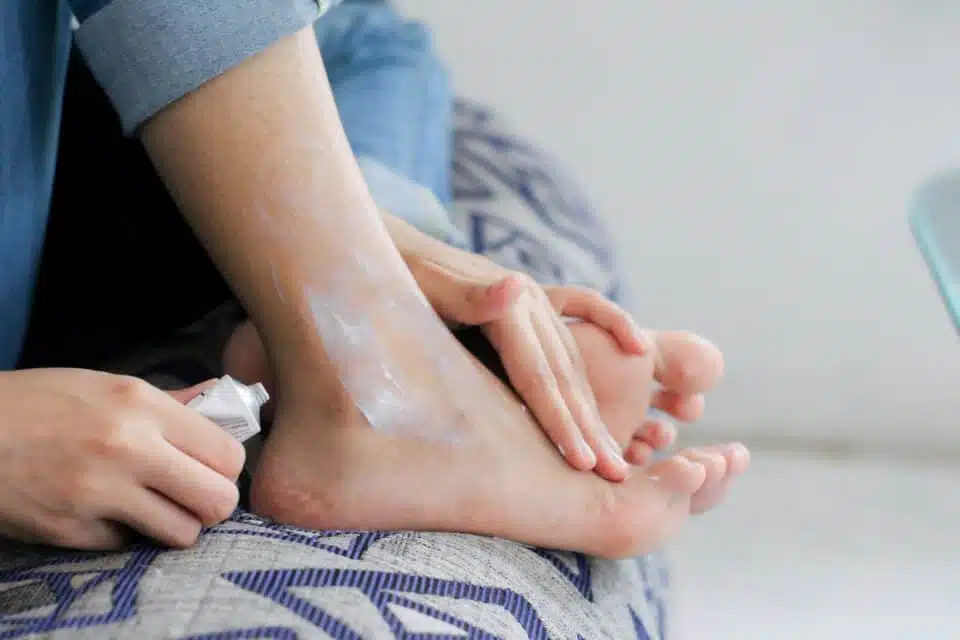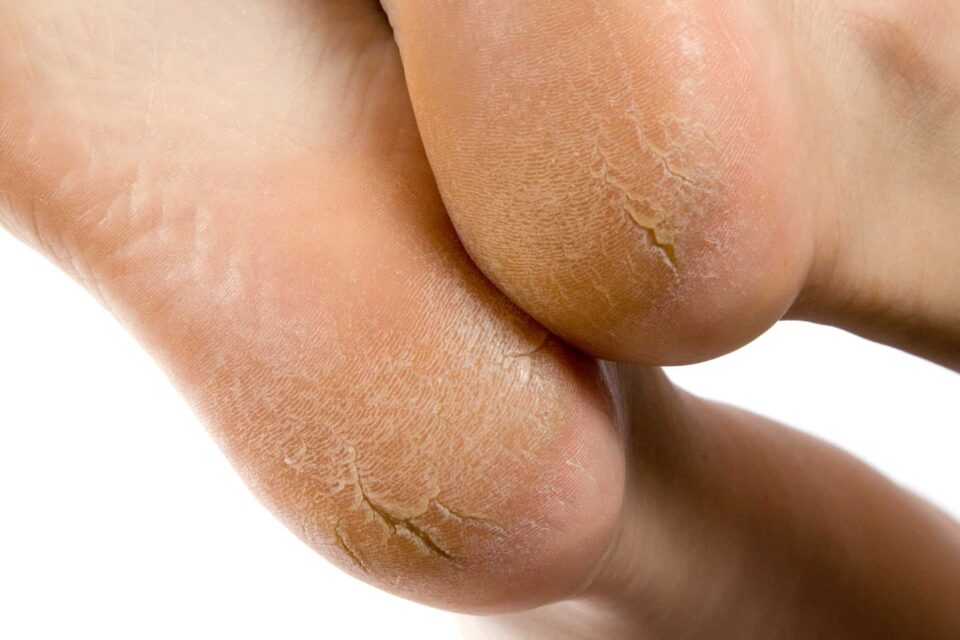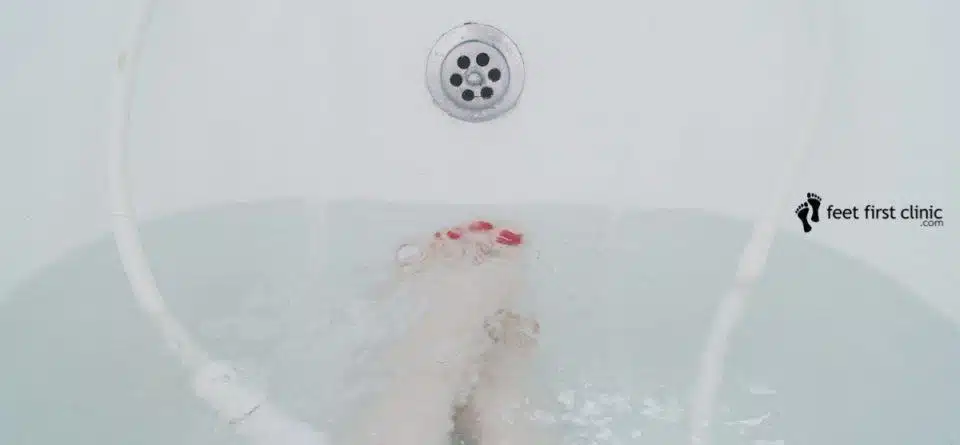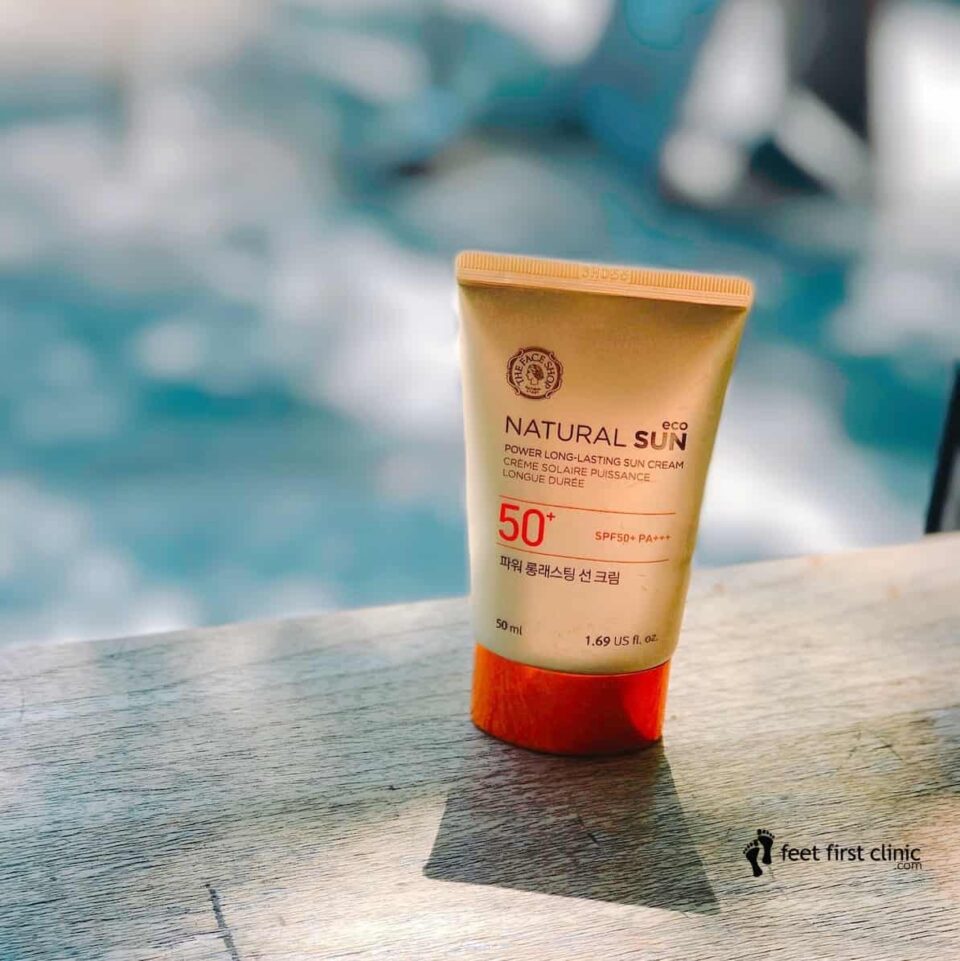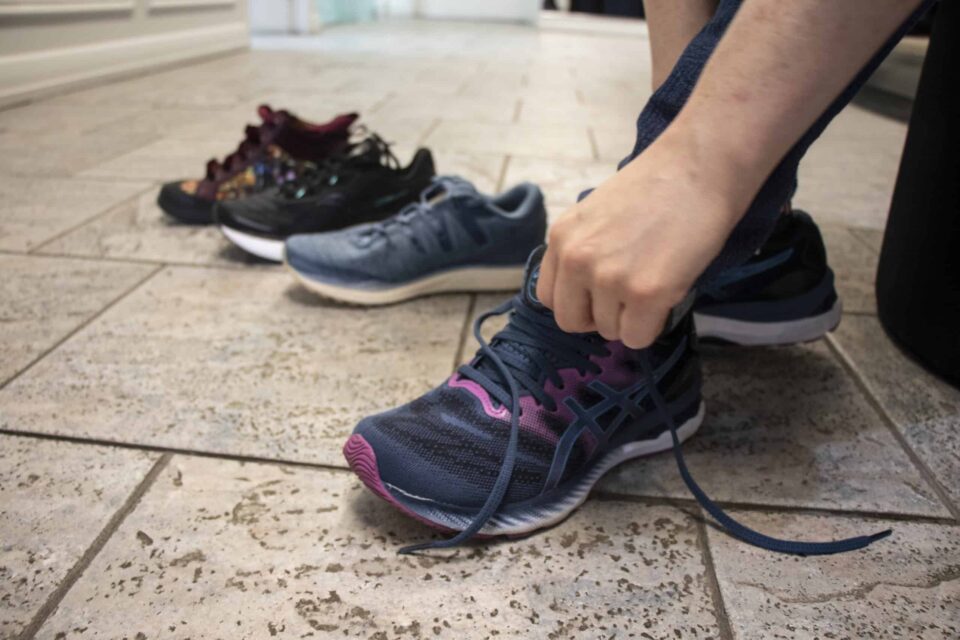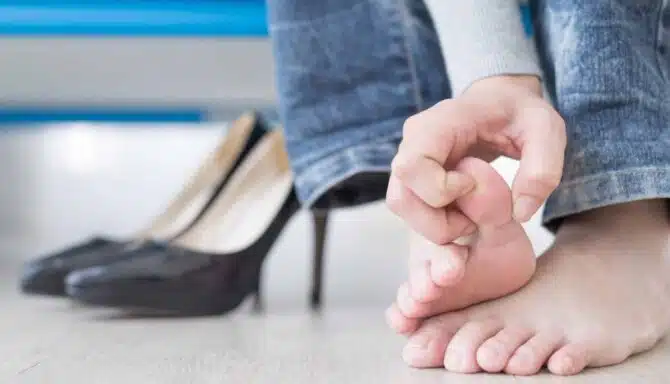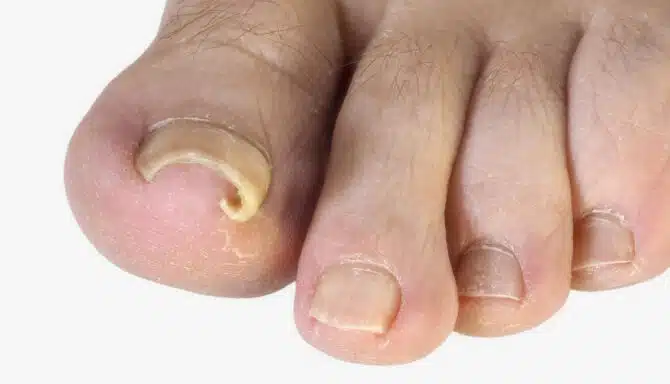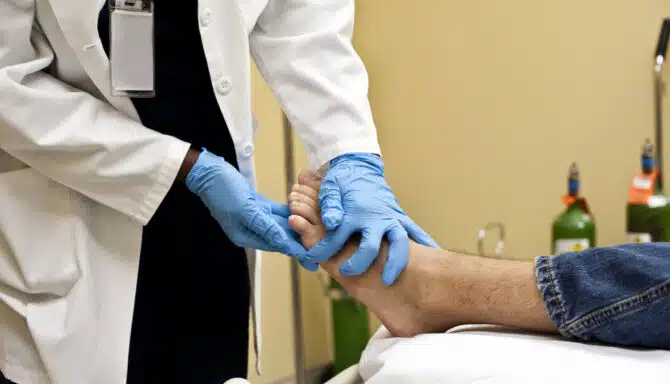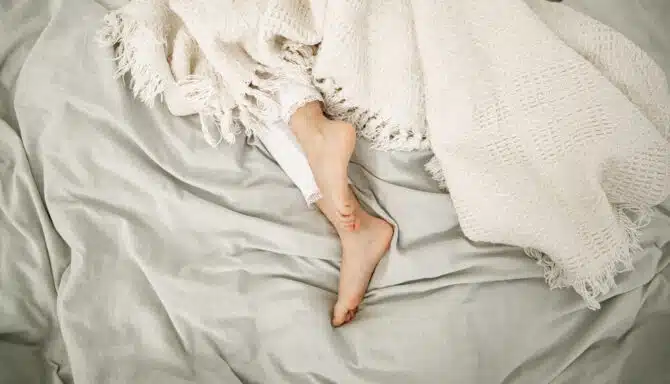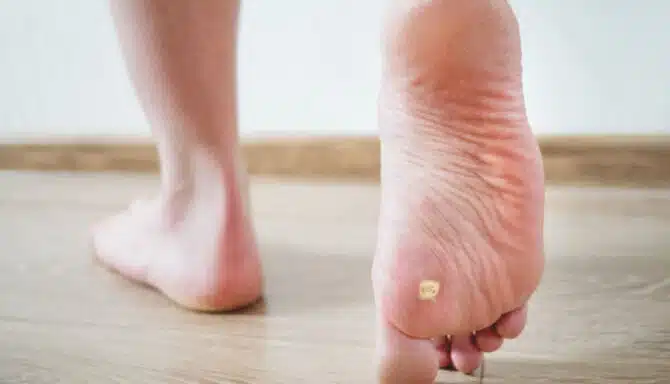December 26, 2024
While corns and plantar warts may look alike at first glance, they differ significantly in their causes, symptoms, and treatments. If you’re unsure about whether you have a corn or a plantar wart, visiting a chiropodist can help you receive an accurate diagnosis and appropriate treatment. Whether it’s corn enucleation or wart removal, timely intervention with a podiatrist or chiropodist at a foot clinic will ensure your feet stay healthy and pain-free.
What are Corns?
Corns are small, thickened areas of skin that develop in response to repeated friction, pressure, or irritation. They usually develop on the feet, particularly in weight-bearing areas such as the tops and sides of the toes or on the soles. Foot corns are essentially the skin's way of protecting itself from friction, forming as a shield for the underlying skin. The hardened layer is your body’s method of preventing skin ulceration.
There are different types of foot corns, each with its own characteristics. Hard corns are small, round, and painful, typically found on the bottom of the foot due to abnormal pressure or friction. Soft corns, which are usually located between the toes, are white and rubbery due to moisture. Seed corns are tiny, painless and appear on the sole of the foot.
Corns: Causes, Risk Factors and Symptoms
Generally speaking, corns are caused by inefficient foot mechanics which lead to excessive pressure and friction. They may also be linked to other foot conditions. For example, an abnormal gait pattern due to flat feet can lead to pressure points. This can then cause corn formation in vulnerable areas of your foot. Here are some key risk factors and causes:
Wearing high heels often.
Wearing shoes that are the wrong size.
Wearing uncomfortable shoes.
Not wearing socks with your shoes.
Irregular walking motion / abnormal gait.
Corn Symptoms Include:
Thickened, hardened areas of skin on the toes, sides, or soles of the feet
Rough or waxy texture on the affected area
Localized pain or tenderness, especially when pressure is applied
Yellowish or greyish appearance, sometimes with a central core
Discomfort during walking or wearing tight-fitting shoes
Interference with daily activities in severe cases
What are Plantar Warts?
Plantar warts are localized skin infections caused by certain strains of the human papillomavirus (HPV), specifically types 1, 2, and 4 which target the epidermis—the outermost layer of the skin. The strain of HPV can sometimes determine how painful a plantar wart may be. For example, HPV 1 may cause deeper, more painful warts, while HPV 2 causes more superficial ones.
These warts develop on the plantar surface of the foot, which includes the sole and heel, areas that bear significant weight and endure pressure during standing and walking. Unlike some other HPV-related warts, plantar warts are non-cancerous and are confined to the feet, as the virus is adapted to thrive in the thicker, tougher skin found on the soles. Plantar warts can last anywhere from two months to several years, especially if left untreated.
For individuals with a healthy immune system, plantar warts are generally not a significant health concern. However, they can make activities like walking, standing, or running very uncomfortable and painful. The pressure exerted on the wart may cause irritation and discomfort, which causes hardened skin to build up over the wart. The latter is also a big reason people confuse them with corns or calluses.
It’s important to seek treatment as soon as you notice any symptoms: Even if it's not interfering with your daily routine, it is still contagious so you can infect others. In addition, addressing these symptoms promptly with a foot specialist like a chiropodist or podiatrist can prevent further complications.
Plantar Warts: Causes, Risk Factors and Symptoms
Plantar warts are contagious and similar to fungal infections like athlete’s foot in that you can contract them by walking barefoot in public, moist spaces. Here are some more details on what activities or risk factors may lead to plantar warts:
You have a weakened immune system. Many people's immune system can recognize and fight off the HPV virus before warts form. However, people with a poorly functioning immune system are more susceptible as their body is less equipped recognize and fight the HPV virus. People who are immunocompromised may take longer to fight the virus, meaning that that the warts will take longer to treat.
You’re 65 or older, or a child or teenager: Plantar warts can be more common in these age brackets. For children, their immune systems are still developing, and they’re more likely to share communal spaces like gyms and locker rooms. For seniors, the immune system may be compromised.
Environment exposure and being barefoot: Frequenting warm, moist environments like swimming pools, locker rooms, and communal showers increases exposure to HPV. These areas are ideal breeding grounds for the virus, making it easy to contract through bare feet. Walking barefoot on abrasive surfaces, like pool decks or gym mats, can also create micro-injuries that allow HPV to enter.
Skin cracks and abrasions: Any break in the skin, including cracks, blisters, or injuries, can act as an entry point for the virus.
Poor foot hygiene practices: Neglecting foot care, such as not cleaning feet thoroughly or allowing them to remain damp for prolonged periods, can create conditions favourable for infection.
Plantar Wart Symptoms Include:
Rough, thick circular patches that have similar colouring and shape to a cauliflower.
Warts that form on the heels, around your toes, or on the ball of the foot.
Other discoloration: brown, pink, yellow or gray.
“Wart seeds” – which look like a small black dot in the wart
Pain, tenderness and general discomfort.
Bleeding.
Both cluster and solitary growth are possible.
Corns and Plantar Warts: Key Differences
While warts and corns can look and feel very similar, the main difference lies what causes them. Corns are caused by the body's response to excessive friction against the skin, whereas plantar warts are caused by strands of the contagious HPV virus.
Here are two additional ways to help distinguish between corns and plantar warts.
Pain type: Plantar warts may cause pain when pinched from the sides, whereas corns are tender when pressure is applied directly to them.
Appearance: Corns have a “waxy” yellowish appearance, whereas plantar warts often have a black dot in the centre. And while difficult to tell, warts go much deeper into the skin than corns.
Location: Corns tend to occur in the non-weight bearing parts of the foot, like between or on top of the toes. Conversely, plantar warts tend to occur on the weight-bearing parts of the foot, like the ball of the foot.
Multiplication and Spreading: Corns are concentrated in pressure-points on the foot and don't typically "spread". Plantar warts, however, can multiply and spread to other parts of the foot if the virus is allowed to grow unchecked.
Corns and Plantar Warts: Treatment and Prevention
https://www.youtube.com/shorts/TDV3Dd98oOM
Many services performed by a chiropodist or podiatrist are available at a foot clinic and can target both conditions.
How to Treat Plantar Warts
Plantar wart treatment requires a specialized approach. As they're caused by a virus, they cannot simply be "removed". Rather, depending on the severity of the warts, the frequency of re-exposure to the virus, and the person's immune system, warts can take multiple treatments spanning over several months.
Here are the different treatment options for plantar warts, in order from most conservative to most aggressive:
Salicylic acid, a common over-the-counter treatment, gradually softens the wart and sheds layers of skin. Although it is not painful, it may take longer to see results. For a faster alternative, a chiropodist can prescribe a higher-strength salicylic acid solution to be applied at home with follow-up visits. The chiropodist will then routinely debride the dead skin covering the wart to allow better penetration of the medication.
Cryotherapy, or freezing, is another standard method where liquid nitrogen is applied to the wart to freeze and destroy the wart tissue. This treatment may cause temporary pain and requires multiple sessions, each 2 -3 weeks apart.
Cantharone (canthacur) is an acid applied by a chiropodist that causes a blister to form and the wart to lift off the skin, typically within a few days. Although this treatment is more effective and doesn't take as long as cryotherapy, the resulting blister may be uncomfortable. This is the most common treatment used by chiropodists. It requires multiple treatments, each 2 - 3 weeks apart (though typically not as many as cryotherapy).
Wart needling is a surgical procedure. It involves puncturing the wart multiple times with a sterile needle to trigger the body's immune response. It is a good option for multiple or resistant warts.
Finally, excision involves surgical removal of the wart. It is reserved for stubborn warts that don't respond to other treatments, and has a risk of scarring. It is seldom used.
How to Treat Corns
A chiropodist or podiatrist can treat corns by gently shaving down the thickened skin with sterilized tools. The treatment is effective, safe, typically painless, and will discomfort without risking infection.
Inserts and custom orthotics can also play a significant role in managing and preventing recurrent corns. Custom orthotics are specially designed to provide support and distribute pressure evenly across the foot. This reduces the friction and pressure points that can lead to corns. Over-the-counter insoles and inserts can also provide extra cushioning and improve the fit of shoes, offering relief and preventing further irritation.
Self care can also go a long way. Soaking corns in warm water softens them, making it easier to reduce its size. It's also important to moisturize your feet regularly to make the skin stronger and more flexible, which will reduce its sensitivity to friction and hardened skin buildup. Toe pads or non-medicated patches can also protect corns from further irritation and promote healing.
Lastly, but equally important, you must find the right shoes to wear for each season and choose shoes with a proper fit. This can help prevent the pressure and friction that causes foot corns. A complimentary shoe fitting at a foot clinic can help!
https://www.youtube.com/shorts/R7GV0GbKhvQ
